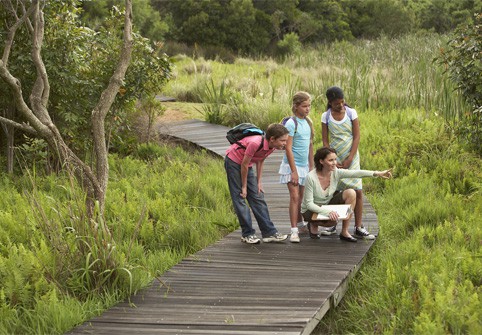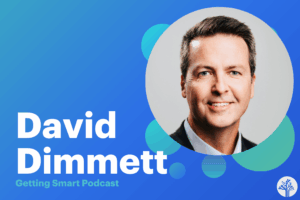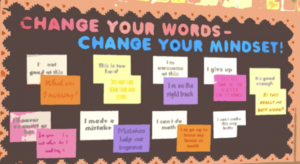Innovation Mindset = Growth + Maker + Team Experiences

What do young people need to know and be able to do be successful? Sure reading, writing, and problem solving are important to just about every family wage job. Content knowledge gives you something to work with, but what else is important for success in life? It turns out there are a bunch of factors that schools seldom talk about, teach, or provide feedback on that are at least as important as academic skills.
What research says. Two traits predict success in life: grit and self-control; that was the conclusion Penn professor Angela Lee Duckworth reached eight years ago. On the other coast, Stanford University professor Carol Dweck uncovered the importance of a “growth mindset,” the belief that abilities can be developed through dedication and hard work. Dweck says that people with a growth mindset “believe that their most basic abilities can be developed through dedication and hard work.” This stands in contrast to talents that are fixed traits. These research findings were applied to education in 2013 in Paul Tough’s book, How Children Succeed: Grit, Curiosity, and the Hidden Power of Character.
A 2012 CCSR lit review said that grades do a better job than tests at measuring life success habits including study skills, attendance, work habits, time management, metacognitive strategies and social and academic problem solving that allow students to successfully mange new environments and meet new demands. The CCSR report outlined evidence for other success factors including the beliefs young people have about their own intelligence, their self-control and persistence, and the quality of their relationships with peers and adults.
This research emerged as top performing networks saw their graduates complete college at lower than expected rates. Many concluded that the success formula was more than high test scores and included traits of perseverance built up through productive struggle–reinforcement to the advocates of social emotional learning, character development, and so-called 21st century skills.
The Hewlett Foundation advocates for Deeper Learning–an antidote for a thin test prep curriculum—including development ofacademic mindsets, “Students develop positive attitudes and beliefs about themselves as learners that increase their academic perseverance and prompt them to engage in productive academic behaviors.” The definition is a bit broader than growth mindset adding, “Students are committed to seeing work through to completion, meeting their goals and doing quality work.” That means “allowing them to search for solutions and overcome obstacles.”
Beyond growth. While determined effort may be a foundational characteristic for academic success, there are other dispositions key to success in the idea economy. A study from Deloitte Growth Enterprise Services supports the idea that entrepreneurially minded individuals and companies are essential to economic growth. A Deloitte exec observed, “entrepreneurial behavior matters to performance, and any company, regardless of its size, can adopt the kind of entrepreneurial approaches that can help them outperform across a variety of metrics.” (To learn more, read the original study here, and for coverage by The Wall Street Journal, click here.)
The Kern Entrepreneurship Education Network (KEEN) a network of U.S. universities that “strive to instill an entrepreneurial mindset in undergraduate engineering and technology students.” KEEN aims to graduate engineers who will contribute to business success. The framework (detailed here) includes entrepreneurial mindset, multidimensional problem solving, productive collaboration, and integrity.
The KEEN frame is a great framework but it could use a dose of maker. The Imagination Foundation (where I’m a director) imagines a world “where creativity and entrepreneurship are core social values nurtured in schools, homes and communities everywhere; where all
children are taught to be creative thinkers and doers, and encouraged to
make their very best ideas happen.” A survey of 1,500 CEOs from 60 countries and 33 industries identifies creativity as the “most crucial factor for future success.” (Read the IBM Survey.)
In Makers: The New Industrial Revolution, Wired editor Chris Anderson notes a re-emergence of tinkering and building made user-friendly for the Internet Age. In the narrowest sense, the term “Maker” refers to a new category of builders using open-source methods, and new tools like 3D printers to move manufacturing from the factory to the desktop. More broadly, this new age hacking is related to the growing interest in learning to code and working as a freelancer—the reality that many young people will need to ‘make’ a job not just get a job. Whether making a living, coding an app, or printing a gear, it’s the maker mindset—self-directed, purpose driven, and iterative.
Matt Candler runs education incubator 4.0 Schools (and there should be one in every city). Candler bakes three big ideas into each 4.0 experience—be user-centric, be curious, and iterate. In other words, embrace the fact that we’re preparing most kids for jobs that don’t currently exist, try some new strategies, and make “many more smaller, faster bets.”
Edupreneurs like Summit Public Schools CEO Diane Tavenner apply lean startup and iterative development strategies to building new tools and schools. Summit’s culture of innovation “encourages ideas and exploration, but does so through an intentional and thoughtful process to enable a laser-like focus on our mission.” Innovation at Summit follows a “Build, Measure, Learn approach.” They “rigorously and regularly explore data, identify problems and challenges, develop and implement solutions, and then check back with the data,” to offer the best education possible. Summit not only applies these strategies to running schools, they provide regular feedback to students on their “habits of success.”
Team. The Partnership for 21st Century Skills reinforces the focus on creativity and (like KEEN) adds collaboration, “Learning and innovation skills are what separate students who are prepared for increasingly complex life and work environments in today’s world and those who are not. They include: Creativity and Innovation, Critical Thinking and Problem Solving Communication and Collaboration.
Hewlett adds, “Students cooperate to identify and create solutions to academic, social, vocational and personal challenges.” That also requires that they “communicate and understand multiple points of view and they know how to cooperate to achieve a shared goal.”
Compiling these dispositions, the best umbrella term (borrowing from business literature) is innovation mindset—a combination of growth, maker, and team mindsets (assuming that complementary critical thinking, problem solving, and communication expectations are at least moderately well communicated through common standards). Below is a summary of emerging and advanced skills and dispositions for an innovation mindset.
| Emergent (Student) | Advanced (Teacher/Edupreneur) | |
| Growth mindset |
-Knows effort matters, takes initiative around opportunity-Meets goals by doing quality work -Knows how they learn best |
-Define problems, opportunities, and solutions in terms of value creation-Resilience to overcome failure |
| Maker mindset |
-Exhibits curiosity and resourcefulness-Locate/use tools to complete tasks-Learn from setbacks |
-Leads design thinking, uses “and” thinking to resolve tough dilemmas-User-centric iterative strategies -Pursue personal fulfillment by defining purpose and creating value |
| Team mindset |
-Collaborate to identify and create solutions-Understand multiple points of view -Asks for help when needed |
-Proactively “expand the pie” to make an impact-Substantiate claims with data and facts -Develops social capital by delivering value and exhibiting trustworthiness |
I statements. Author Bernie Trilling has been thinking and writing about career preparation and powerful learning experiences for a long time. He compiled a set of critical dispositions and turned them into “I” statements which turn rather abstract concepts into statements we can all imagine young people speaking. Adapted for this growth + maker + team frame, following are the kinds of statements young people should be able to record in a digital portfolio.
Growth Mindset
- Growth mindset: I can learn
- Self-efficacy and confidence: I can do this
- Goal setting and managing: I can reach my goals
- Persistence and Resilience: I can overcome setbacks
- Metacognition: I know myself and what I need to do
Maker Mindsets
- Curiosity: I’m interested in learning
- Creativity: I ask what if? Why not?
- Purpose and relevance: this is important to me
- Contribution: I can create value
Team Mindset
- Social belonging: I belong here
- Understanding: I appreciate that point of view
- Social capital: I can get the help I need
Dispositions are harder to measure than math skills so I’m not ready to suggest that Innovation Mindset measures be added to education accountability systems. However, there is such widespread agreement that effort matters and that collaboration skills are absolutely vital and it appears that than entrepreneurial bent is extremely valuable. If that’s the case, we owe it to students to create learning experiences where they can develop these dispositions and the associated skills, and that we encourager development, reflection and provide regular feedback to students.






Melia Abreu
This is probably one of the most comprehensive ways to look at the non-cogs of educational development and I appreciate how you are pushing the conversation using frameworks that are contemporary drivers that have continued to show up in multiple areas. I also appreciate the reservations you have in coupling these with accountability systems already in place. I wonder how the Innovation Mindset could serve as a framework for designing educational programs and professional learning for adults. Lots of food for thought...thanks for steering this "mindsets" conversation in this way to address our current educational landscape.